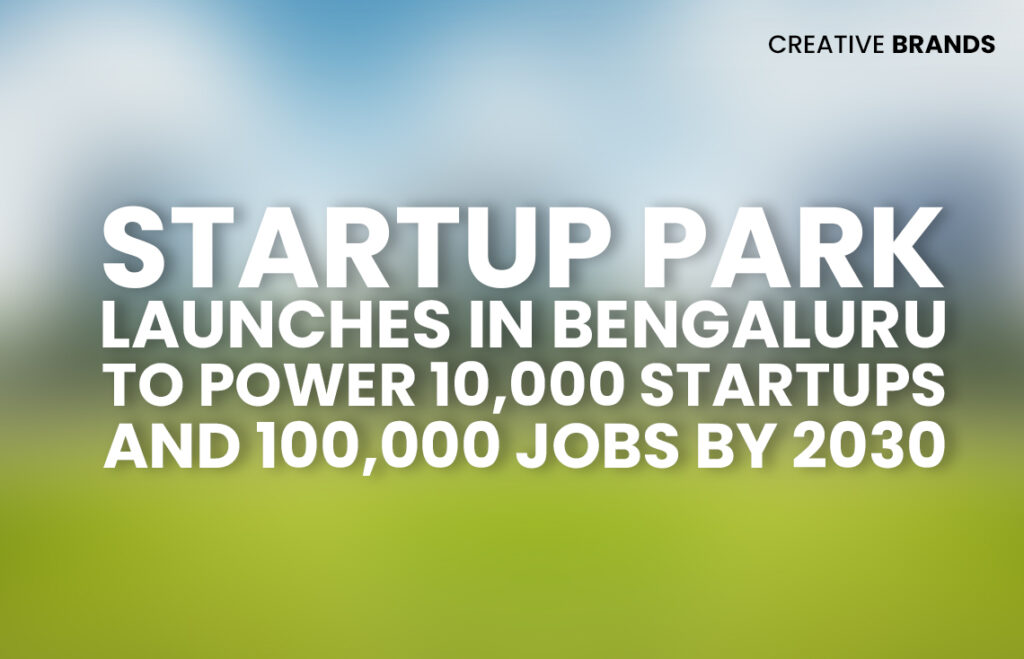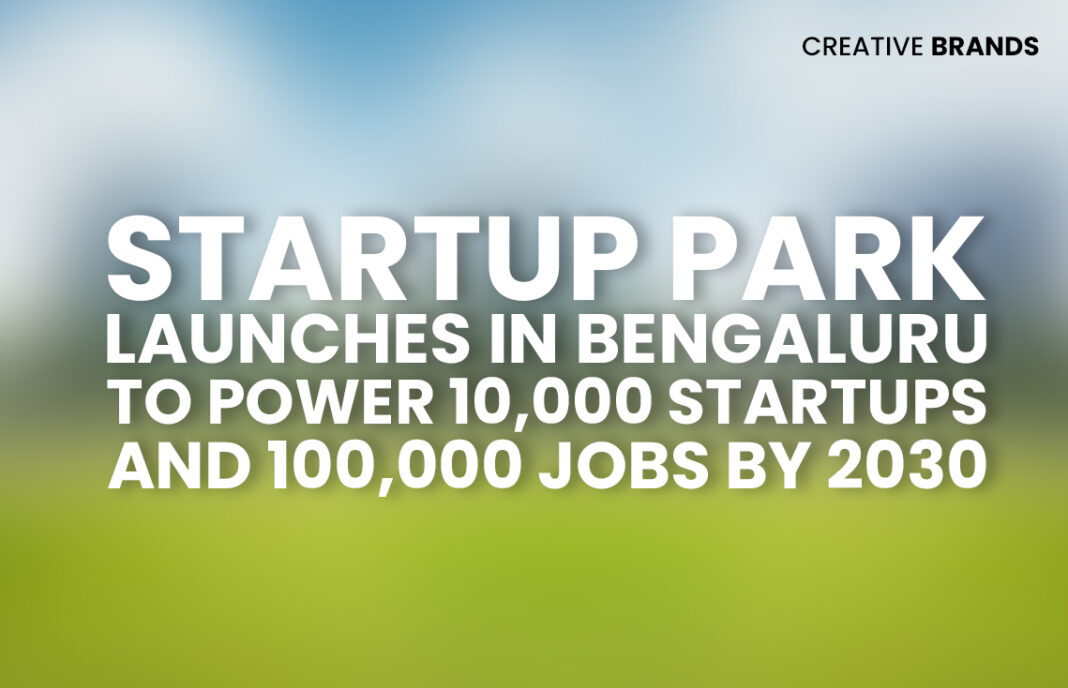iQue Ventures has launched Startup Park in Bengaluru’s Koramangala, a ₹600 crore innovation hub designed to support 10,000 startups and create 100,000 jobs by 2030. Led by founder Shafi Shoukath, the facility integrates coworking hubs, labs, pitch studios, and investor lounges, strengthening Bengaluru’s position as India’s startup capital.

Startup Park, launched by iQue Ventures in Bengaluru in November 2025, arrives as one of the most ambitious catalysts for India’s innovation economy in recent years. Conceived as a large-scale ecosystem built to nurture startups from idea to scale, the ₹600 crore initiative reflects both the confidence and urgency shaping India’s technology landscape. At a time when entrepreneurship is expanding beyond traditional software models into deep tech, hardware, sustainability, and frontier markets, Startup Park positions itself as an inclusive growth engine capable of supporting more than 10,000 startups and generating 100,000 jobs by the end of the decade. This vision, championed by founder and CEO Shafi Shoukath, represents not just infrastructure development but a long-term commitment to strengthening India’s startup pipeline at every stage.
Located in Bengaluru’s Koramangala, the heart of India’s technology and entrepreneurial culture, Startup Park is designed to be more than a conventional coworking space. Spread across a prominent innovation corridor, it integrates state-of-the-art coworking hubs, pitch studios, research labs, and investor lounges to create a seamless environment where hardware and software ventures can build, test, and grow. Unlike most startup facilities that focus primarily on early-stage digital ventures, Startup Park also places significant emphasis on hardware incubation—an area where Indian entrepreneurs often struggle due to access constraints, prototyping costs, and infrastructure gaps. By providing access to specialized labs and technical support under one roof, the initiative addresses a longstanding pain point in the country’s innovation system.
The grand launch of Startup Park, marked by the presence of key leaders such as Karnataka Deputy Chief Minister D.K. Shivakumar, entrepreneur Ashneer Grover, and investor Anupam Mittal, sent a clear message about the project’s potential. Their participation reinforced Bengaluru’s continuing status as India’s startup capital—a city where more than 25,000 startups have emerged over the past decade and where India’s unicorn surge first took shape. With the city’s entrepreneurial ecosystem evolving rapidly, Startup Park enters at a time when the demand for high-quality incubation, mentorship, and scaling pathways has never been greater.
For Shafi Shoukath, the vision behind Startup Park extends far beyond creating physical spaces. He sees it as a dynamic platform that empowers innovators with resources typically accessible only in mature ecosystems like Silicon Valley, Shenzhen, or Singapore. By combining cutting-edge facilities with curated mentorship programs, policy support, and investor access, the initiative aims to democratize the startup journey, making it possible for entrepreneurs from diverse regions and backgrounds to build global-scale businesses. The focus on job creation—100,000 jobs by 2030—also aligns with India’s broader economic priorities as the country strives to equip its youth for a future shaped by technology, automation, and digital transformation.
What differentiates Startup Park from many other incubators is the deliberate integration of multiple support systems into one unified ecosystem. The coworking hubs are designed for flexibility and collaboration, offering entrepreneurs a vibrant networking atmosphere and the infrastructure they need to operate from day one. The pitch studios provide a professional environment for founders to present their ideas to investors, regulators, and potential partners. These studios are equipped with high-quality audiovisual setups, recording tools, and staging resources that help early-stage founders showcase their innovations more effectively.
The research labs serve as the backbone for hardware startups, offering access to prototyping tools, testing equipment, fabrication technologies, and engineering support. In a country where hardware ventures often face prohibitive costs and limited access to specialized facilities, these labs provide a critical bridge. They help shorten development cycles, reduce overheads, and give hardware entrepreneurs a chance to compete on a global stage with accelerated timelines.
Meanwhile, the investor lounges function as hubs for funding conversations, portfolio nurturing, and deal-making. These curated spaces allow venture capitalists, angel investors, and corporate innovation teams to interact closely with founders, making the fundraising process more transparent and efficient. The integration of investors into the ecosystem ensures that promising startups have easier access to mentorship, financial support, and strategic partnerships.
The significance of Startup Park also lies in what it represents for India’s evolving entrepreneurial narrative. As Bengaluru continues to cement its place among the world’s most dynamic tech hubs, the need for more structured, large-scale, and inclusive support systems has grown. Startup Park reflects a shift from fragmented incubation models to consolidated innovation ecosystems designed to support thousands of ventures simultaneously. This model mirrors global innovation clusters, where infrastructure, capital, talent, and mentorship exist in constant proximity, fueling exponential growth.
Another dimension of the initiative is its timing. India is witnessing an unprecedented wave of entrepreneurial interest driven by digital adoption, government policies, and a surge of young talent. Sectors such as artificial intelligence, electric mobility, robotics, biotechnology, fintech, climate tech, and clean energy are emerging as critical growth areas for the next decade. Startup Park’s focus on supporting both hardware and software innovations positions it to play a meaningful role in propelling these sectors forward.
The presence of influential figures like Ashneer Grover and Anupam Mittal at the launch adds credence to the project’s potential impact. Grover, known for his scale-driven approach and outspoken support for founder-led growth, brings visibility and critical insights to the initiative’s mission. Mittal, with his experience as both an entrepreneur and an investor, adds a layer of mentorship that could influence early-stage startups in building sustainable, long-term companies. Karnataka Deputy Chief Minister D.K. Shivakumar’s participation underscores the state’s commitment to nurturing entrepreneurship and expanding its innovation footprint across regions.
Startup Park also holds symbolic significance at a time when India is redefining its position in the global innovation landscape. Over the past few years, the country has emerged as one of the world’s fastest-growing startup ecosystems, producing unicorns at a rapid pace and attracting unprecedented venture capital. Yet challenges persist—access to capital for early-stage founders, limited hardware manufacturing infrastructure, mentorship gaps, and the need for more sophisticated incubation environments. The initiative aims to address these gaps holistically, making entrepreneurship more accessible and reducing the friction that often slows down or derails promising ideas.
Beyond infrastructure, the success of Startup Park will likely depend on how well it builds community. Entrepreneurial ecosystems thrive when founders, investors, mentors, and policymakers interact frequently in meaningful ways. Startup Park’s design encourages these touchpoints, from informal networking zones to curated events, hackathons, accelerators, and bootcamps. Such engagements create opportunities for collaboration, cross-sector partnerships, and idea exchange—essential fuel for an innovation economy.
Another key aspect is its commitment to job creation. By aiming to generate 100,000 jobs by 2030, Startup Park aligns itself with national goals of employment, skilling, and inclusive economic growth. Technology startups, though often small in their early years, have the potential to create large ripple effects across sectors. For instance, every software or hardware venture generates demand for engineers, designers, marketing professionals, trainers, researchers, and support staff. The inclusive growth strategy embedded in Startup Park’s vision could thus contribute significantly to India’s workforce development.
As India accelerates its digital transformation, Startup Park symbolizes a new phase in the country’s innovation journey. It represents a belief in the transformative power of startups, a commitment to supporting founders from ideation to scale, and an ambition to build world-class innovation infrastructure within the country. Bengaluru, already home to some of India’s most iconic startups, continues to expand its horizons through initiatives like this, strengthening its reputation as the cradle of entrepreneurial dreams.
By bringing together high-quality infrastructure, investment access, mentorship, and a collaborative community, Startup Park aims to create not just a hub but a thriving ecosystem where ideas can grow into impactful, job-creating, future-ready enterprises. As the year 2030 approaches, the true measure of its success will lie not only in the number of startups it houses but in the innovations it helps shape—innovations that could very well define the next chapter of India’s growth story.
Discover more from Creative Brands
Subscribe to get the latest posts sent to your email.






